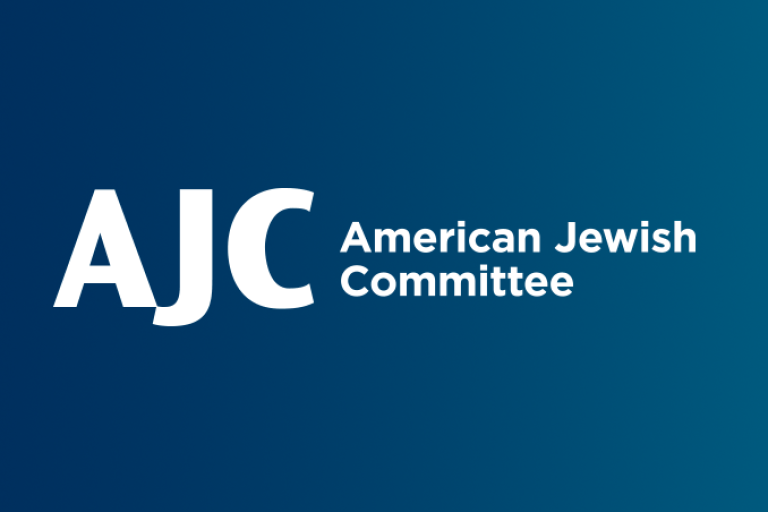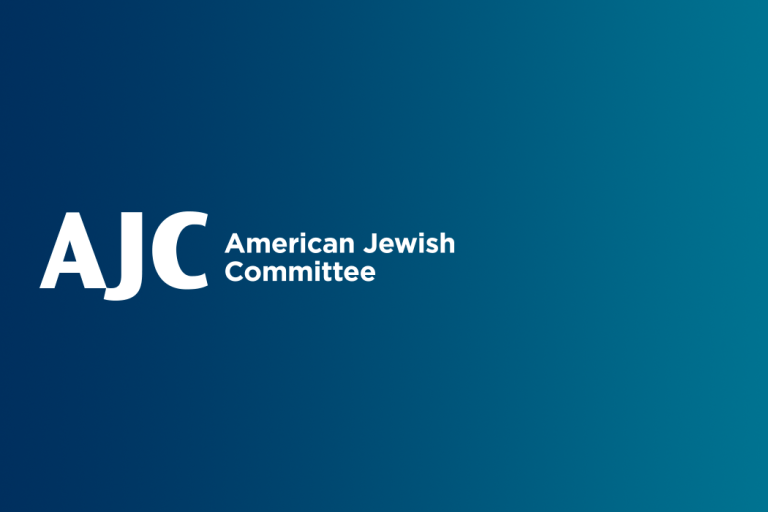September 6, 2022
It is no secret that antisemitism is on the rise in the United States. Despite comprising only just 2% percent of the U.S. population, Jews were the target of 55% of all religiously motivated hate crimes in 2020, according to the FBI. Further, American Jewish Committee’s 2021 State of Antisemitism in America report revealed that 24% of American Jews have been personally targeted by antisemitism in the past 12 months and 90% of respondents believe antisemitism is a problem in the U.S.
While many Jewish organizations, including AJC, have raised alarm bells on this rise and offered ways to combat its growth, until now, there has not been a single resource for all sectors of American society to tackle the world’s oldest hatred.
The release of AJC’s Call to Action Against Antisemitism: A Society-Wide Nonpartisan Guide for America seeks to mobilize and unite American leadership in all sectors of society to understand, respond to, and prevent antisemitism.
Here are the top five takeaways from AJC’s Call to Action.
- Combating antisemitism in Europe, now America
In May 2015, American Jewish Committee convened a landmark strategy conference in Brussels to address growing antisemitism in Europe. This AJC Call to Action urged European governments to make the fight against antisemitism an urgent priority for individual countries, and collectively for the entire EU.
“It was called a defining moment for Europe, and there was a call to action adopted at this groundbreaking conference. It focused on European leadership, Jewish community security antisemitism on social media, measuring hate crimes, better education,” said Holly Huffnagle, AJC’s U.S. Director of Combating Antisemitism.
While Europe was the first to see this revival in the rise of antisemitism during the early 2000s, the U.S. has unfortunately followed suit. AJC documented this rise in three groundbreaking surveys on the state of antisemitism in America, first in 2019, and then again in 2020 and 2021, which all detail the deep anxiety among American Jews and divergent views among the general public about the severity of antisemitism in the U.S.
At the same time, incidents of antisemitic rhetoric, vandalism, and violent attacks have all increased, including the 2018 Tree of Life – Or L’Simcha Congregation synagogue attack that left 11 dead, the 2019 deadly attack on a synagogue in Poway, California, and the hostage situation at a synagogue in Colleyville, Texas this past January.
Pointing to the Colleyville hostage situation, Huffnagle said that the attack put into perspective the misunderstanding of antisemitism in the U.S. She cited how the FBI initially reported the attack did not have to do with the Jewish community. She also noted how the religious extremism driving the attack was downplayed.
“We really were seeing this increased violence, this increased openness of antisemitism in the United States. And there wasn't a collective call to action here,” said Huffnagle.
“We were seeing it also becoming more mainstream in society, and something had to be done. We decided that a static action plan would not be enough. What we really needed was a call to action - a mobilizing tool that would be a resource for all Americans. And that is what we did.”
- Why is antisemitism an issue for all Americans?
Many Americans are not aware of what antisemitism is and that it is increasing. In AJC’s 2021 State of Antisemitism Report, the survey found among the general American public that while 44% of respondents believed that antisemitism was increasing, a total of 56% responded that it was either decreasing, staying the same, or were not sure. As such, the first step before response and prevention is understanding what antisemitism is, what it looks like, and why it is an issue for all Americans.
When we witness the weakening of a democratic, pluralistic society, we see rising antisemitism. Because at its core, antisemitism is envy, resentment, distrust, and conspiracy. It is not only an attack on Jews; antisemitism is really an assault on the core values of America.
“That's really our message here: that it's up to all Americans to realize that antisemitism is a problem that will affect everyone if not addressed,” said Huffnagle.
- How can every member of American society address rising antisemitism?
While combating antisemitism is not new, the Call to Action report takes the issue a step further and lays out specific prescriptions for different sectors of American society: government, law enforcement, civil society, the private sector, educational institutions, and more.
“You can trace AJC’s advocacy and policy prescriptions to counter antisemitism back to our inception as an organization over a century ago, but what's different now is that these prescriptions are gathered in one place for key audiences of American leadership,” said Huffnagle.
The report provides targeted outreach to each sector with specific action items they can take when confronted with various scenarios stemming from antisemitic incidents to attitudes to harassing conduct.
“People ask, ‘What can I do to counter antisemitism?’ We get this question a lot. We can always answer and say, “Speak up, call it out, and be an ally to the Jewish community.’ And those are all very important, but they are very general answers,” Huffnagle said.
“It is much more useful to be specific.”
For instance, in the case of the media, the resource provides ways to guard against visual displays of hate when an antisemitic incident is being covered on TV and information for reporters on who to call to better understand mainstream Jewish perspectives.
“We need that targeted outreach to these different audiences. And that's what this Call to Action does,” Huffnagle said.
- How should social media companies address growing digital antisemitism?
The digitization of antisemitism is the biggest contributor to its spread in the last decade: tech and entertainment companies have a special and critical role to play.
One key aspect here is calling on these companies to utilize the International Holocaust Remembrance Alliance (IHRA) Working Definition of Antisemitism in drafting their policies.
Huffnagle noted this uniformity across platforms would “allow artificial intelligence and human moderators to be more consistent in either content removal or demotion.”
Additionally, social media companies should hire a point person focused on the Jewish community who would serve as a point person for both listening to Jewish concerns, and work with senior leadership within the company.
“Some companies have consistent outreach with Jewish communal leaders, but many don't,” Huffnagle said. “For those who do not, we're asking that they start regular meetings with Jewish stakeholders.”
- What steps are needed to prevent antisemitism?
The Call to Action prioritizes prevention, calling on all sectors of American leadership to take preventative measures to stop antisemitism before it happens.
One of the preventative measures laid out in the report is for audiences to be aware of patterns.
“We know from tracking antisemitism that there are days and events, which are likely to trigger anti-Jewish incidents and when antisemitism spikes,” Huffnagle said.
In particular, the report highlights elections, Jewish holidays, and an uptick in violence in the Middle East, which triggered at least an 80% increase in antisemitism in the United States during and following the Hamas-triggered conflict with Israel in May 2021.
“By planning for these increases, law enforcement, for example, can safeguard local Jewish communities and prevent attacks before they occur,” explained Huffnagle.
She added that other sectors can also take preventative measures.
“Companies can be prepared to offer additional support for Jewish employees. Social media companies can increase AI and human moderation on their platforms, and [college] campuses could prevent antisemitism by including it in the several mandatory trainings that incoming students take on anti-harassment.”


